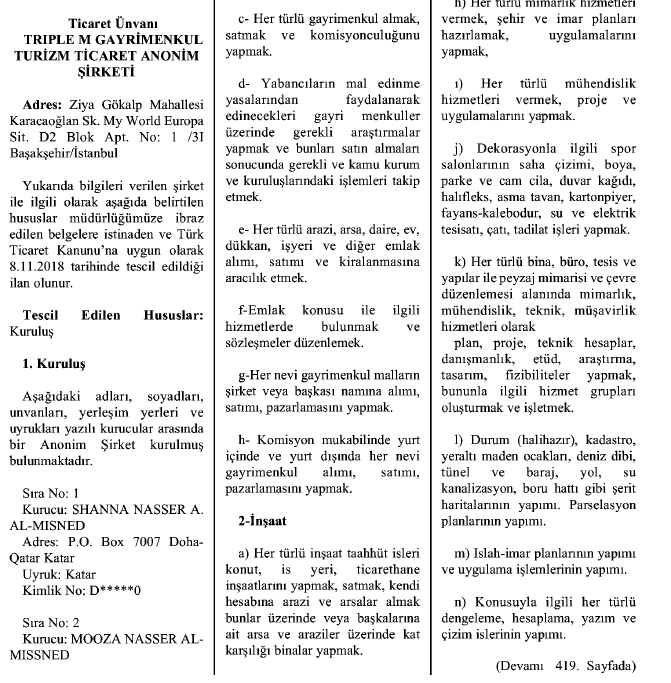In January 2020, the Turkish Ministry of Environment approved a large-scale infrastructure project known as the Istanbul Canal, or “Erdogan’s Crazy Project” as it has been referred to by local media. Public records reveal that businesses with warm relations with Erdogan and the ruling Justice and Development Party (AKP), as well as the Qatari government, stand to benefit the most from the project.
The proposed canal would be a 28-mile waterway joining the Black Sea to the Sea of Marmara. Turkish local media claims that the canal will provide relief to cargo vessels, particularly oil tankers, and will decrease transit costs as well as become the preferred route for international shipping companies. The project is estimated to cost 75 billion lira (approximately $11.1 billion).
Istanbul Airport and the Limak-Kolin-Cengiz-Mapa-Kalyon Consortium
The canal will purportedly be built through the build-operate-transfer model (BOT), a system used to finance large infrastructure projects through public-private partnerships. In a BOT model, the government grants a concession to the private sector to build, operate, and after the granted period of time, transfer the infrastructure project to the government.
Through such public-private partnerships, the private companies responsible for the projects stand to profit significantly by temporarily operating the newly-built infrastructural objects before transferring them to the government. This raises the question of which companies will receive contracts for the canal.
The answer may be found by investigating the recently overhauled Istanbul Airport. As Turkey’s Investment database notes, the airport, built through the BOT model, was constructed and operationalized by the Limak-Kolin-Cengiz-Mapa-Kalyon consortium under the name of Istanbul Grand Airport. In 2016, four of these companies, excluding Mapa, were also contracted for a highway construction worth millions as part of the Northern Marmara Motorway project.
The Turkish conglomerates Mapa Insaat, Cengiz Holding, Kalyon Holding, Kolin Insaat, and Limak Holding—the companies that make up the consortium—have all capitalized from having close ties with the AKP and Turkish President Recep Tayyip Erdogan. Public records reveal that each entity was granted a 20 percent share of the Istanbul Airport project. Kalyon Insaat, in particular, shares ownership connections to Turkuvaz Media Group and Demirtas Holding, another media giant that controls the majority of media outlets in Turkey. In addition to the airport, Kalyon Insaat was responsible for various national infrastructure projects; building highways, railways, and metro lines in Turkey.
While tenders are still being submitted for the project, it is possible that the same conglomerates will be involved in the construction of the Istanbul Canal.
Qatar’s Sheikha Moza bint Nasser al-Misnad Purchases Land Along the Canal Route
Turkish land records obtained by local journalists reveal that the Qatari Emir Sheikh Tamin bin Hamad al-Thani’s mother, Sheikha Moza bint Nasser al-Misnad, purchased land along the route of the canal. Sheikha Moza bint Nasser al-Misnad has previously purchased property in London worth millions, according to media reports.
Records found in the Turkish Trade Registry Gazette show that on Nov. 8, 2018, Moza bint Nasser al-Misnad, along with Shanna Nasser A. al-Misned and Muneera Nasser A. al-Misnad, founded Triple M Gayrimenkul Turizm Ticaret Anonim Şirketi, a joint-stock company involved in real estate and tourism in Istanbul. Less than two months later, Triple M purchased just over 44,702 square meters of land along the route of the future Istanbul Canal

Fig. 1: Excerpt from the Turkish Trade Register Gazette showing Moza bint Nasser al-Misnad (written here as MOOZA NASSER AL-MISSNED) as one of the founders of Triple M Gayrimenkul Turizm Ticaret Anonim Şirketi.
Once the canal is complete, the value of land alongside it is expected to skyrocket, positioning Erdogan’s Qatari allies to profit greatly from the project. Erdogan’s own family appears to be following suit. In January 2020, Turkey’s Treasury and Finance Minister Berat Albayrak, Erdogan’s son-in-law, also purchased 3.2 acres of land along the route of the canal.
An Increasingly Warm Relationship Between Turkey and Qatar
The purchase of land follows an increase of Turkish-Qatari cooperation in recent years. In 2018, Emir Tamin bin Hamad al-Thani donated a private jet worth approximately $500 million to the Turkish government after being informed that Turkey was interested in purchasing a Boeing 747-8i. Five months later, BMC, a Qatari-Turkish owned commercial and military vehicle manufacturer that produces Kirpi armored vehicles, gifted Erdogan a luxury coach bus, which was delivered to the presidential complex in Ankara.
Public records list Ethem Sancak, a Turkish businessman with close ties to the AKP and a friend of Erdogan, and a Qatari counterpart, Nasser Jaralla S. Jaralla, as the Chairman and the Vice President of BMC. In addition to a number of other companies, Sancak is listed as the owner of two media companies, Star Medya and T Medya, and he was also on AKP’s Central Decision Making and Executive Board (MKYK) in 2017. Publicly available data indicates that 49.9 percent of BMC is owned by the Qatar Armed Forces Industry Committee.
The Istanbul Canal is one more massive infrastructure project added to the list of various AKP-backed projects. It underlines the collusion of the state and private sector in Turkey, and further demonstrates how public records can reveal how billions in contracts and property can go to entities and individuals that are close to Erdogan and the ruling political parties in the country.